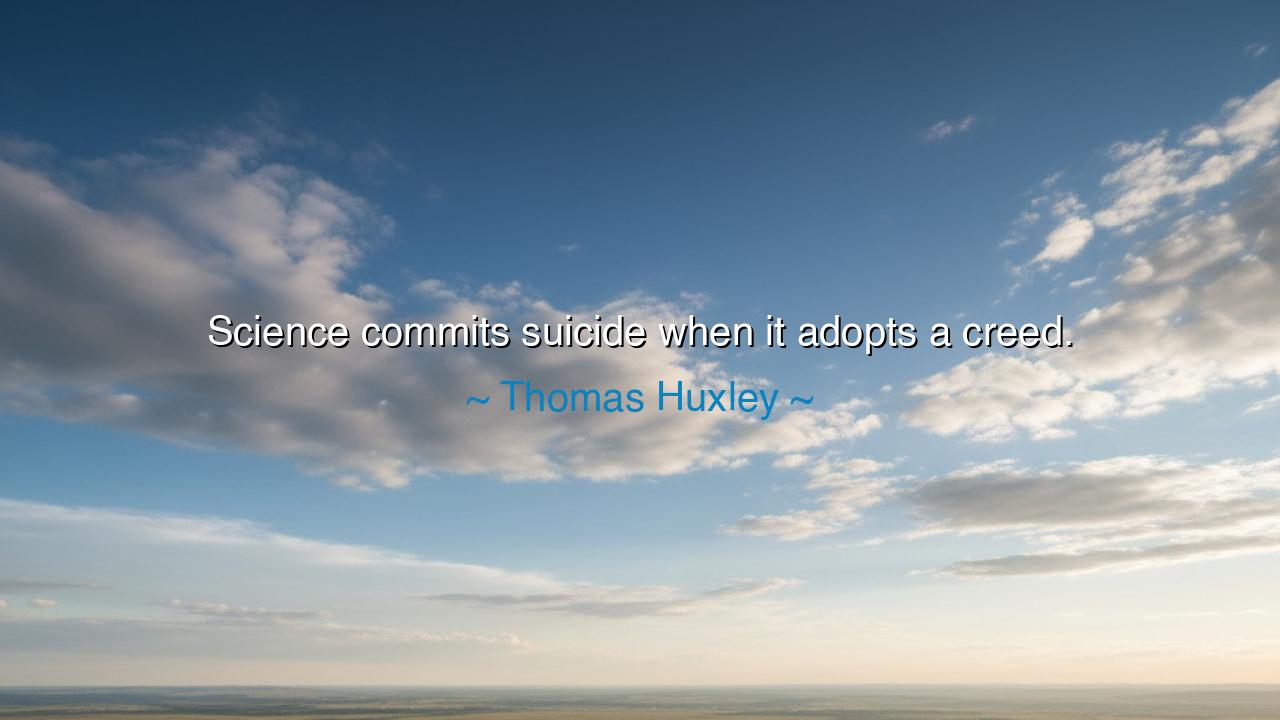
Science commits suicide when it adopts a creed.






Hear me, O Children of Knowledge, for the words of Thomas Huxley ring out with a truth that calls to the very essence of science itself. "Science commits suicide when it adopts a creed." These words, though simple, hold a power that strikes at the heart of the scientific endeavor. Huxley speaks not of the pursuit of knowledge, but of the peril that lies in turning that pursuit into a rigid doctrine, a set of beliefs that are held without question or inquiry. Science, in its purest form, is a journey—an ever-evolving path that seeks understanding not through dogma, but through the relentless questioning of all things, including its own assumptions.
In the ancient days, when Greek philosophers like Socrates walked the earth, they did not accept knowledge as absolute; rather, they sought to probe and question it endlessly. Socrates famously proclaimed, "I know that I know nothing," a statement that reflects the very essence of the scientific spirit: the understanding that knowledge is not a fixed structure but a living, breathing thing that evolves with each question we dare to ask. The philosophers of his time saw truth not as something handed down by authority, but as something that must be sought, challenged, and redefined. Huxley's words echo this ancient wisdom, reminding us that once science adopts a creed, it ceases to be the path of exploration and becomes a mere echo of what is already known.
Consider, O Children, the example of Galileo Galilei, whose scientific method was rooted in questioning the accepted truths of his time. When Galileo peered through his telescope and saw that the planets revolved around the sun, he did not merely accept the established view. Instead, he sought the truth with reason and evidence. The Church at that time had its creed, a belief that the Earth was at the center of the universe, and Galileo’s discoveries threatened to unravel this belief. But Galileo, faithful to the spirit of science, stood firm, not in the face of a particular creed, but in the pursuit of truth. He did not allow himself to be bound by the rigid beliefs of others, for he knew that science could not thrive in the soil of dogma.
It is this same spirit that Huxley warns us to preserve in our own time. Science, in its truest form, is a dynamic, open-ended process. It does not cling to the truths of the past, nor does it seek to impose a fixed set of beliefs upon the world. To do so is to betray its very nature. For when science adopts a creed, it shuts the door to further inquiry. It stops asking questions and begins to demand answers, answers that are not discovered through exploration, but through the acceptance of preordained conclusions. Huxley’s words remind us that the greatest discoveries come not from blind adherence to a belief, but from the courage to question, to challenge, and to seek understanding beyond the confines of tradition.
Look to the story of Charles Darwin, who, in his journey to understand the origins of life, faced opposition not only from the religious authorities of his time but from the scientific community itself. His theory of evolution through natural selection was not born from a rigid belief, but from observation, evidence, and the willingness to accept that the truth might be something radically different from the prevailing ideas of the world. Darwin’s courage in questioning the accepted wisdom of his time led to a revolution in biology, a revolution that reshaped how we understand our place in the natural world. Had Darwin held tightly to a creed, he would have never made his discoveries, for the truth he sought was not a part of any doctrine but was hidden within the patterns of nature itself.
The lesson here, O Seekers of Knowledge, is this: the spirit of science is bound to no creed, no authority, and no fixed truth. Science is a pursuit of the unknown, a journey that requires us to cast aside the comforting weight of established beliefs and walk boldly into the realm of uncertainty. It is the unquestioned belief, the creed, that stifles the pursuit of truth, while it is the questioning mind, the open heart, that allows science to flourish. Huxley’s wisdom teaches us that to embrace a creed is to close our minds to the infinite possibilities of discovery. Science is not about certainty—it is about exploration, and it is through exploration that we learn and grow.
Let these teachings guide you, O Children. In your own lives, do not be swayed by the dogmas of society, whether they come from the realm of science, religion, or politics. Seek always to question, to explore, and to discover anew. Whether you walk the path of science, philosophy, or art, let the spirit of inquiry be your guiding star. Do not be bound by the creeds of others; let your heart be free to seek the truth, wherever it may lead you. For in the end, it is not the beliefs we hold that define us, but the questions we ask and the truths we uncover.
And so, let us remember this great wisdom: Science does not belong to the past, nor does it belong to the present. It belongs to the future, to all who dare to question, to wonder, and to seek. Let the fire of inquiry burn brightly in your hearts, and may you never allow your mind to be confined by the walls of any creed. For in the questioning, the seeking, and the wondering, you will find the answers to the greatest mysteries of the universe. The pursuit of knowledge is a journey without end, a journey that begins with a single question, and continues into the infinite depths of possibility.






AAdministratorAdministrator
Welcome, honored guests. Please leave a comment, we will respond soon